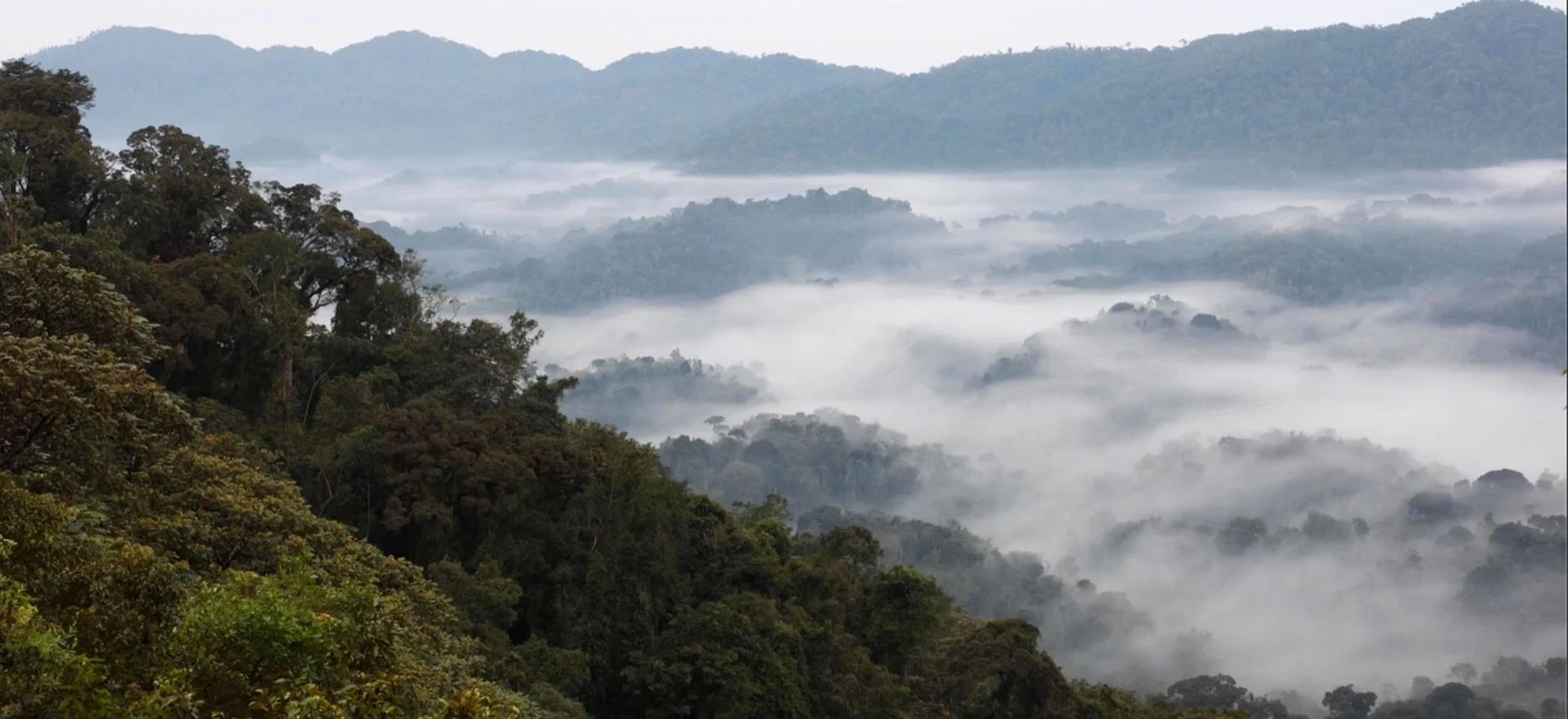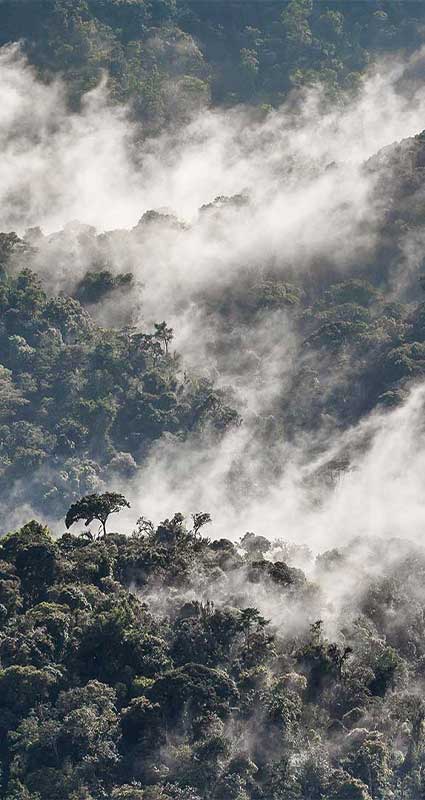SAFARI CAMPS for responsible travellers
The preferred booking platform for lodges & bush camps that offer tangible, measurable benefits for conservation & communities
Nyungwe National Park hosts Africa's most extensive protected tract of montane forest.
This verdant oasis is a biodiversity hotspot bursting with life. Nyungwe covers 1,019km2 (over 100,000 hectares) of forested mountains, burbling streams, sun-starved valleys, and extensive swamps seemingly hiding a myriad of new species waiting to be discovered (or rediscovered).
Part of the Albertine Rift and ranging in altitude from 1,600-3,000m, this high-altitude montane forest towers above Lake Kivu and comprises the watershed between the Congo and Nile Rivers. Some believe it is the most remote source of the Nile River.
🎥 WATCH THIS informative video about Nyungwe National Park
READ MORE about Nyungwe National Park
Expert tip: Staying at a lodge inside the national park means you can start your activities earlier. The early bird catches the worm ...
Information about Nyungwe
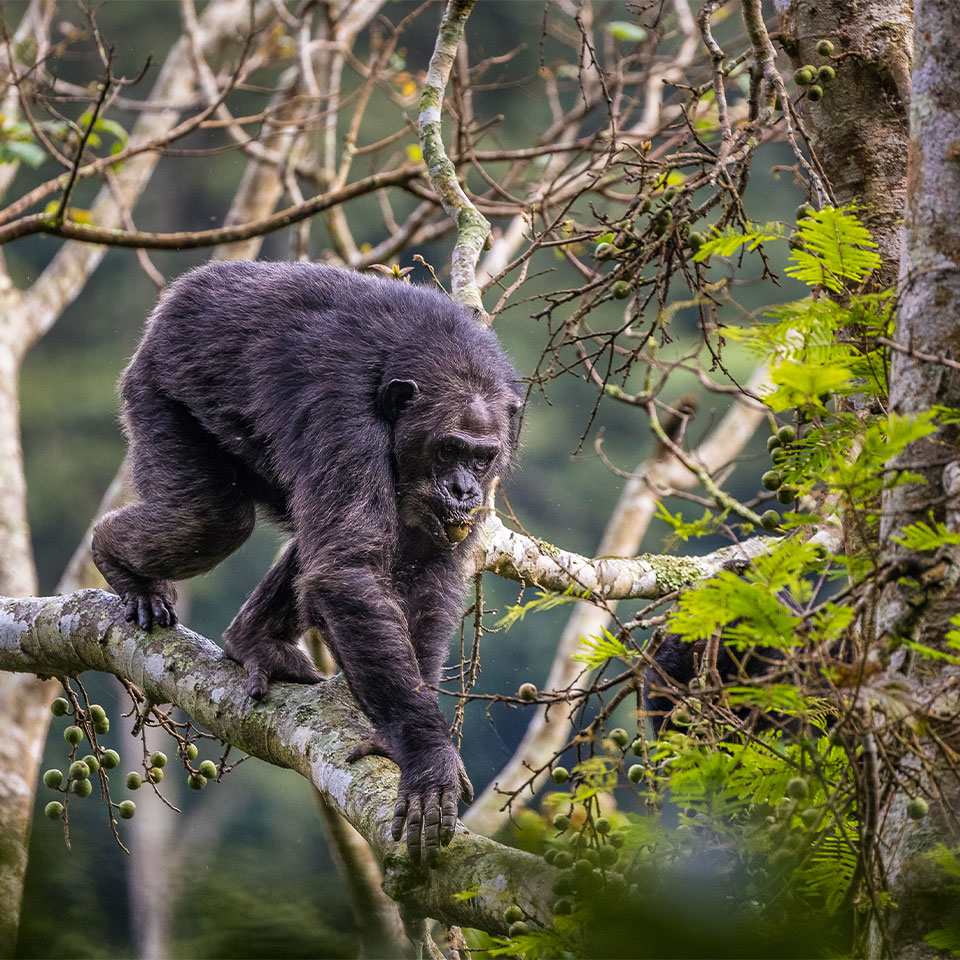
Nyungwe wildlife
Nyungwe wildlife watching is all about primates and birds.
Nyungwe hosts 13 species of primates, and tourists delight in trekking for chimpanzees and other primates such as Rwenzori pied colobus monkeys (including a mega-troop of over 400 individuals), grey-cheeked mangabey, L'Hoest's, Syke's, silver, red-tailed monkeys, and the olive baboon. Owl-faced monkeys occur here but are hard to locate.
Amongst the 75 mammal species found, notables include Congo clawless otters, servals, golden cats, Lord Derby's scaly-tailed squirrels and the rare Central African linsang (related to genets).
The park also hosts over 1,068 plant species (including 140 orchids adding splashes of colour), of which 250 are endemic to the Albertine Rift.
The bird species tally of 337 includes 29 Albertine Rift endemics. Species to look out for include Albertine owlet, red-collared mountain babbler, Rockefeller's sunbird, mountain masked apalis, Ruwenzori turaco, dwarf honeyguide, handsome francolin, Neumann's short-tailed warbler, red-throated alethe and Shelley's crimsonwing.
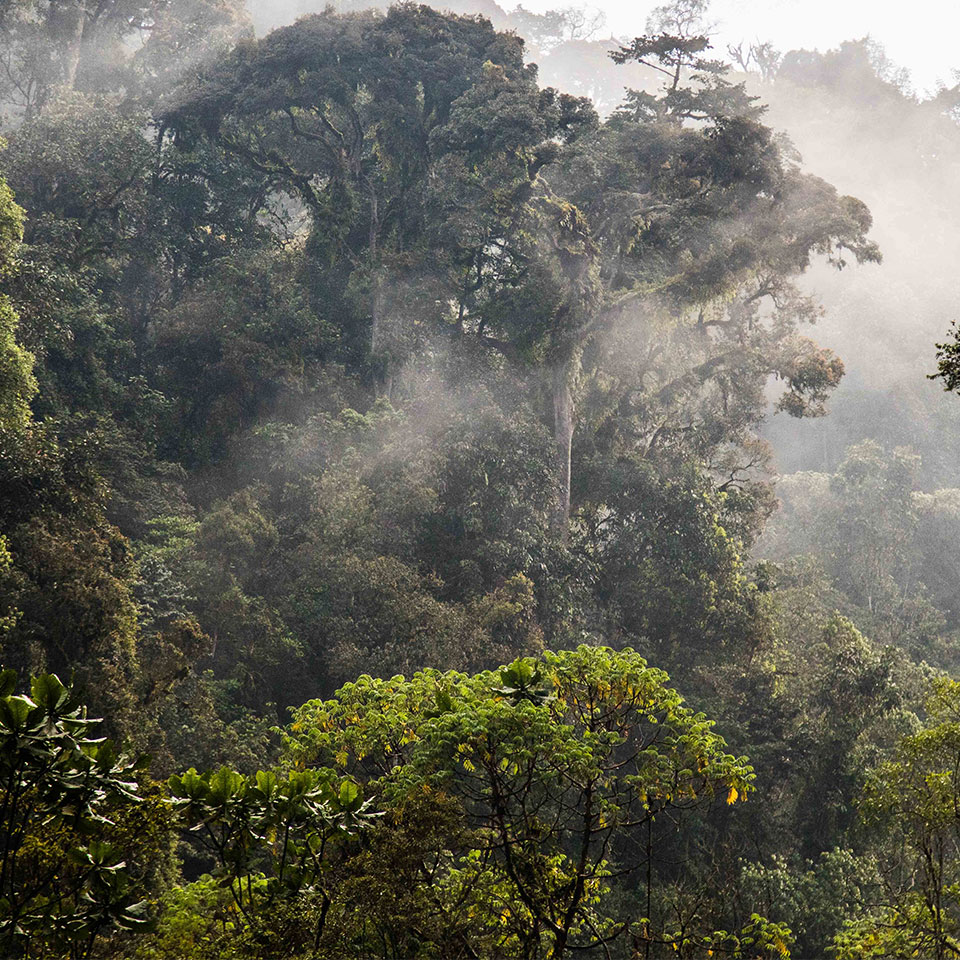
Nyungwe seasons & landscapes
Open all year round;
The climate in Nyungwe is relatively mild, with temperatures seldom reaching over 30˚C. Daily temperatures vary widely due to the high altitude - expect cold temperatures at night and during rainfall. Rainfall varies between 1,800mm and 2,500mm annually;
Rainy seasons - Rain can occur all year round, but expect the most rain in September to November and March to May with the most rain during November;
Dry seasons - The least rain falls in June to August and December to February.
Nyungwe is about high mountain peaks, steep hills, mature tropical forests with dense canopies, countless burbling streams, sun-starved valleys, and extensive swamps.
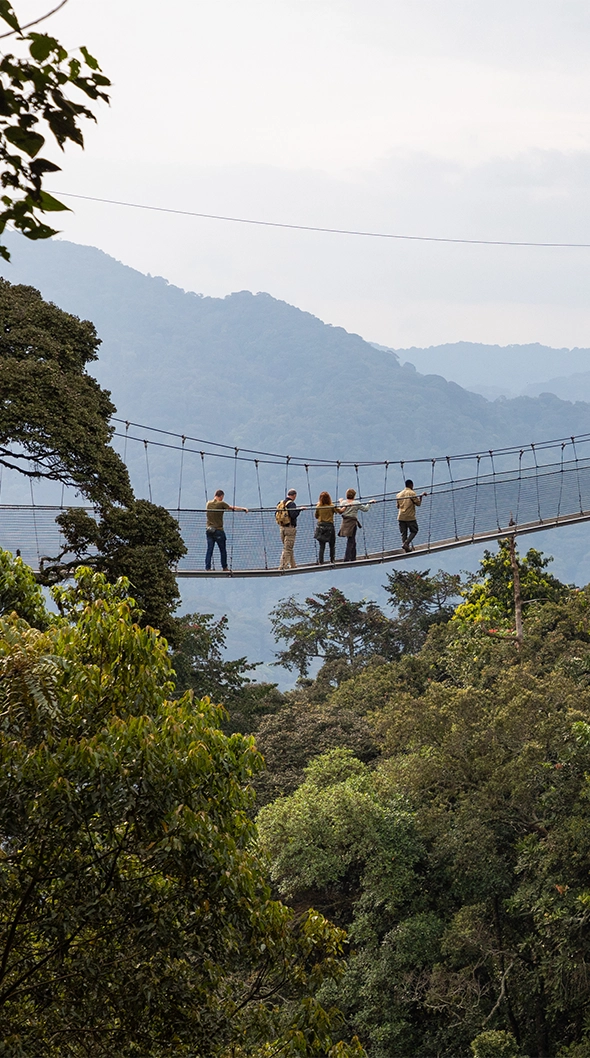
What to do in Nyungwe
Munazi Lodge offers the following activities, all of which have freelance guides to get the most out of your time in Nyungwe:
1 - Chimp trekking in Nyungwe NP and in Cyamudongo Forest (a 2-hour drive from Nyungwe).
2 - Other primates and wildlife. Other primate species include Rwenzori pied colobus monkeys (including a mega-troop of over 400 individuals), grey-cheeked mangabey, L'Hoest's, Grivet's, Syke's, silver, blue, red-tailed monkeys, and the olive baboon. Owl-faced monkeys occur here but are hard to locate.
3 - Bird watching.
3 - Hiking. There is an extensive network of immaculately maintained trails to discover waterfalls, hidden pools, and breathtaking views.
4 - Canopy walkway , which offers incredible views into and beyond the forest canopy. The 160-meter-long walkway is divided into three sections and is accessible via the 2.1km Igishigishigi Trail, which commences at the Uwinka Visitors Centre.
5 - Zip-line - an exhilarating but safe 1,935m guided slide through the forest canopy, providing adrenaline and stunning panoramic views. This remarkable zipline has three distinct sections: 335 meters, 580 meters, and the final and longest section extending 1,020 meters, ending the Canopy walkway
6 - Rope Course. The 280m course near the Gisakura Centre features 20 climbing elements, including four exhilarating ziplines. The course is constructed with steel cables, sturdy gum poles, timber platforms, bridges, hanging tyres, and synthetic combi ropes designed for climbing and suspension activities. A special safety belay system equipped with rolling trolleys ensures participants are securely connected to a safety line throughout the experience.
7 - Uwinka Visitors Centre for coffee, meals, curios, to meet guides and learn about Nyungwe National Park and the activities on offer.
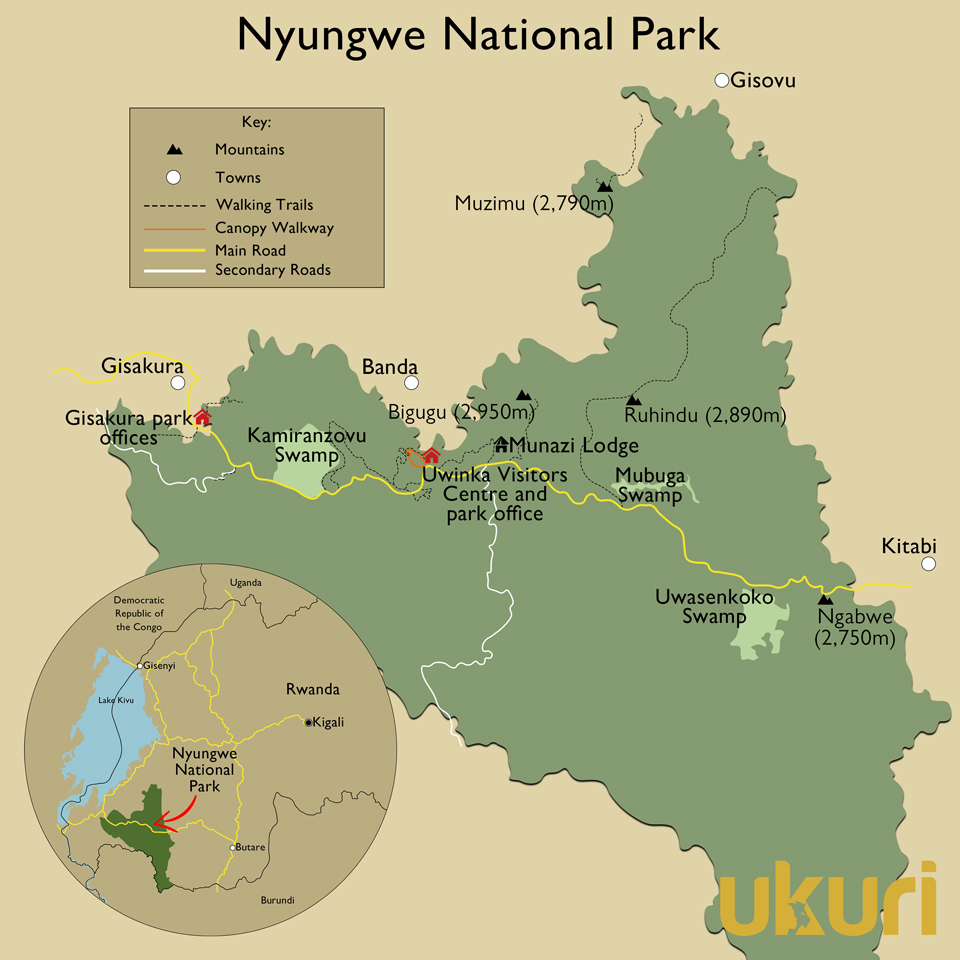
How to get to Nyungwe
Nearest city + major airport: Butare and Cyangugu have airports and are nearby. The capital city Kigali has the only international airport.
By road: The 220km road trip from Kigali to the Uwinka Visitors Centre in Nyungwe NP takes up to 5 hours on good tar roads.
There are car rental companies and drivers/guides available in Kigali.
Speed limits of 80km/hr on open roads and 60km/hr in built-up areas are strictly enforced via numerous digital speed trap cameras. Speed governors limit speed limits in public transport vehicles.

Health essentials
Malaria area: Yes
Nyungwe is a malaria area, although low-risk due to low temperatures and high altitude. A more significant threat lies in travelling through low-lying areas in Rwanda on the way to and from Nyungwe. Please consult your travel doctor about malaria prophylaxis.
Yellow fever area: No
Rwanda is not a yellow fever area. Vaccination is required for travellers arriving from countries with a risk for yellow fever virus transmission. Please consult your travel doctor before travelling for relevant updates.
Tsetse flies: No
Water
We advise against drinking tap water unless it is boiled or filtered. Bottled water is widely available in Rwanda. Bring your own refillable water bottles as plastic bottles are not freely available.
Medical emergencies
Nyungwe is a remote area - please ensure you have evacuation insurance in case of medical emergencies. African Parks utilises the following emergency evacuation service: SATIB24 / ART24 (African risk transfer).
✔️ Vested communities ✔️ Responsible & sustainable
100% of tourism revenue earned by African Parks goes to conservation and local communities
Your safari to Nyungwe National Park will make a difference for local people
Visiting the African Parks camps in Nyungwe is the most direct way to support local communities because these camps help boost:
community tourism programmes to encourage local people to become tourist guides and improve their skills in this area;
bee-keeping as a sustainable agricultural business opportunity;
environmental awareness - In 2021, over 80 community meetings reached over 6,000 community members and local leaders. In addition, over 1,000 children from school environmental clubs visited the park to encourage conservation awareness;
jobs and skills enhancement in Nyungwe National Park via African Parks.
READ ABOUT African Parks community-based projects at Nyungwe
Your stay in Nyungwe will help conservation
Nyungwe’s high biodiversity has exposed it to many threats, including poaching, illegal mining, and agricultural encroachment. Amongst other species, forest elephants and buffalo are confirmed locally extinct.
In 2020, African Parks and the Rwanda Development Board (RDB) signed a 20-year management agreement to restore and protect wildlife, engage with the local communities, and implement an effective law enforcement strategy to ensure the park's long-term ecological, social and economic sustainability.
Nyungwe is now a flourishing primate and birding safari destination for Rwandans and international tourists.
READ ABOUT
Information about Rwanda
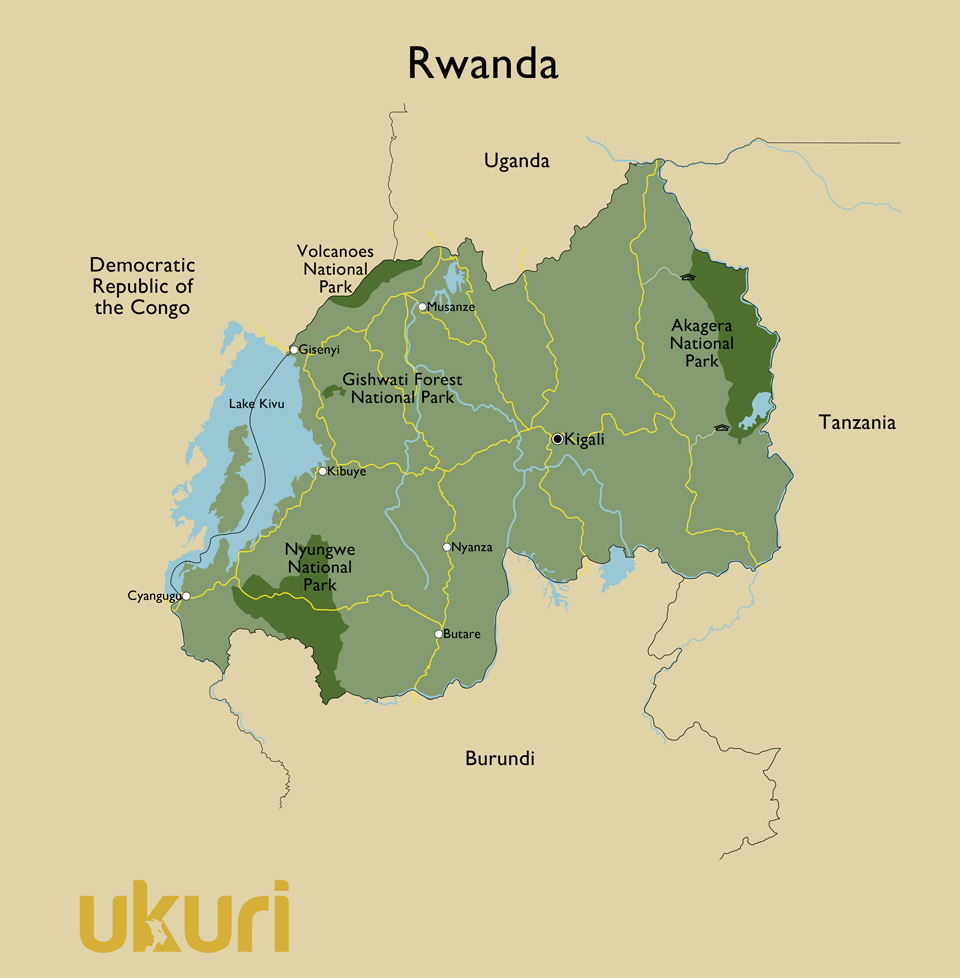
Key Rwanda facts + map
Capital city + tourist hub Kigali.
Languages Kinyarwanda, Swahili, English + French.
Time zone GMT + 2 hours.
Currency Rwandan Franc. Exchange bureaus and ATM's are available in Kigali and most large towns. Many services are via cashless payment only - credit card or local mobile payment gateways/apps.
Visas Enter your details here for visa and other requirements.
Plugs Plug types are C (two small round pins) & J (three small round pins). 230V and 50Hz.
Plastic Note that plastic bags are prohibited, and even plastic bottles are not easy to find. Bring cloth bags and your own refillable water bottle.
Mobile phones SIM cards can be purchased cheaply in Kigali and all large towns. Rwanda has very good phone coverage and internet coverage.
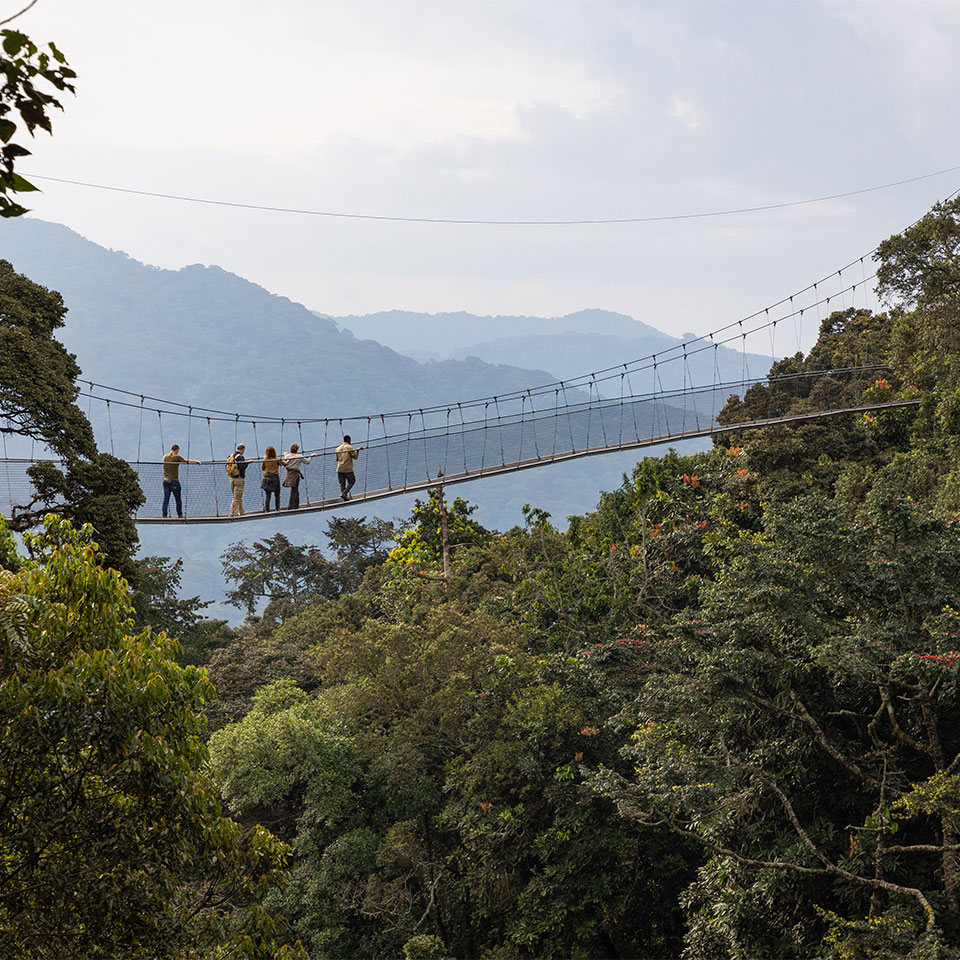
Rwanda travel highlights
Kigali
Rwanda's thriving capital city has modern infrastructure and plenty of restaurants and coffee shops. The Kigali Genocide Memorial is a must-visit if you have a few hours to spare. Kigali is blessed with a wide selection of hotels, B&Bs and guesthouses.
Akagera National Park
Akagera NP shelters Central Africa's largest protected wetland system and offers a superb Big 5 safari experience via game drives and boat trips.
Nyungwe National Park
Nyungwe NP is a magical tract of montane forest bursting with extraordinary biodiversity - excellent for chimp trekking, finding other primates such as the megatroop of 400 Rwenzori pied colobus monkeys, bird watching and the awesome Canopy Walkway suspended bridge.
Volcanoes National Park
Volcanoes NP is a volcanic landscape offering stunning scenery & biodiversity. Major activities include trekking for mountain gorillas and golden monkeys and visiting the legendary Dian Fossey’s grave.
